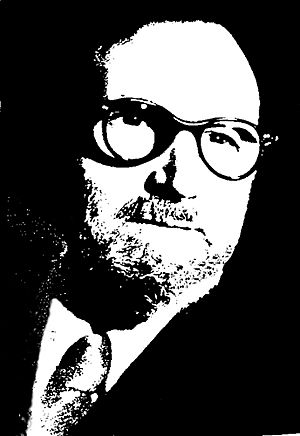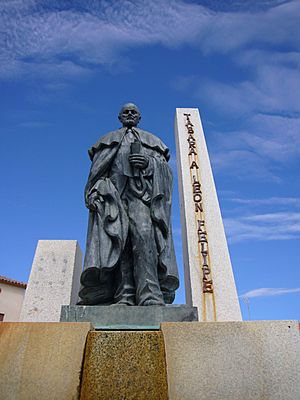León Felipe facts for kids
León Felipe Camino Galicia (born April 11, 1884 – died September 17, 1968) was a Spanish poet. He was known for his strong beliefs against unfair rule.
Biography
Early Life and Writing
León Felipe was born in Tábara, Zamora, Spain. His father was a public notary, which meant he handled important legal documents. The family later settled in Santander.
As a young man, León Felipe studied to become a pharmacist. He even started a pharmacy business. However, he loved literature more than science. He soon left his business to join a traveling theater group. After some challenges, he began writing for magazines. Soon, his first books of poetry were published.
He became one of Spain's most important poets of the 1900s. Experts often mention him with other famous poets like Federico García Lorca. They were part of a group known as the "Generation of 1927."
A Poet in Exile
León Felipe fought in the Spanish Civil War. He was on the side of the Spanish Republican Army. In 1938, he had to leave Spain. He went to live in exile in Mexico. This means he had to live outside his home country.
His poems often talked about the difficult times in Spain. He wrote about the idea that history might repeat its sad events. His style often used repetition, like a song. He also used ideas from the Bible. People compared his work to the American poet Walt Whitman. León Felipe wrote in "free verse," which means his poems did not always rhyme or follow a strict rhythm.
He spent the last decades of his life in Mexico. He became a key figure for other Spanish people who were also living in exile there. He passed away in Mexico City on September 17, 1968.
Interestingly, seven of León Felipe's poems were found in a notebook. This notebook belonged to Che Guevara, a famous revolutionary.
His Famous Poems
León Felipe wrote many collections of poems. Here are some of his well-known works:
- Versos y oraciones de caminante (I, 1920; II, 1929)
- Drop a star (1933)
- Goodbye, Panamá (1936)
- La insignia (1937)
- El payaso de las bofetadas y el pescador de caña (1938)
- El hacha (1939)
- Español del éxodo y del llanto (1939)
- El gran responsable (1940)
- Traducción de Canto a mí mismo, de Walt Whitman (1941)
- El poeta prometeico (1942)
- Ganarás la luz (1943)
- Parábola y poesía (1944)
- Llamadme Publicano (o Versos y blasfemias de caminante) (1950)
- El ciervo (1958)
- Cuatro poemas, con epígrafe y colofón (1958)
- ¿Qué se hizo del rey don Juan? (1962)
- Oh, este viejo y roto violin! (1965)
- Versos del merolico o del sacamuelas (1967)
- Israel (1970)
- Rocinante (1969)
- Puesto ya el pie en el estribo (1983)
See also
 In Spanish: León Felipe para niños
In Spanish: León Felipe para niños



